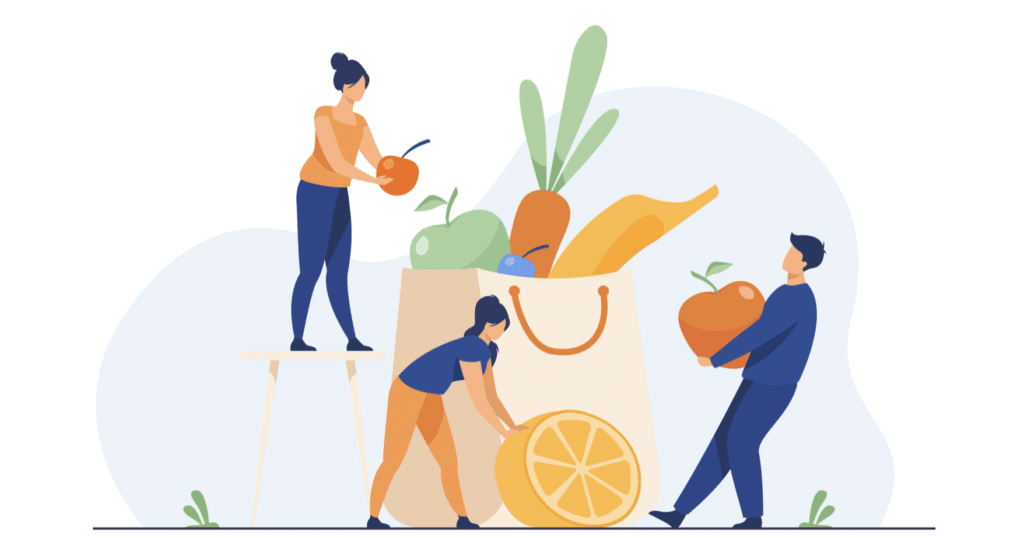
THE BOTTOM LINE:
- A balanced diet rich in whole foods is the best diet for sleep
- Eat regularly to maintain your circadian rhythm
- Avoid eating three hours before bed, but if you need a late-night snack, choose one that won’t disrupt your sleep
Do you enjoy food? Me too. Did you know that the way you eat can impact how well you sleep? Not only does your diet impact your energy levels, body composition, and overall health, the foods you choose every day influences how well (or poorly) you sleep at night.
It may come as no surprise that a healthy diet rich in whole foods improves sleep. The opposite is also true; eating too many processed and unhealthy foods can interfere with your shut-eye. We don’t expect you to be a saint in the kitchen, but making a few changes here and there can significantly improve your nightly slumber. Awareness is power, after all.
Energy intake and sleep
Food choices and the amount of food consumed during the day are associated with sleep duration. Research has shown that people with a shorter sleep time tend to have higher energy intakes than normal sleepers. In some studies, diets high in fat, even when energy intake is average, have been associated with shorter sleep times.
The relationship between a high-fat diet and shorter sleep time is not well understood. Some experts theorize that as the body metabolizes fat, it leads to disruptions in sleep signals by delaying phosphorylation of a sleep-signalling protein called elF2a.
Another theory is that the primary purpose of sleep is the replenishment of energy stores, and since energy expenditure is less for fat than proteins, less sleep may be needed with a high-fat diet. This may help explain why many people on a ketogenic diet feel like they need less sleep.
Protein and carbohydrate intake may also impact sleep. A diet low in protein is associated with less sleep and poorer quality sleep. Some work has also shown that people who consume more than 50% of their energy from quality carbohydrates maintain sleep better than those on lower carbohydrate diets.
People who sleep less than seven hours a night were also found to eat low fibre diets and ate a smaller variety of foods. Likewise, eating a diet that is rich in a variety of foods has been associated with longer sleep times.
Although there has been a lot of work done examining diet on sleep, it is a very complex topic with individual differences. For the majority of people, a balanced diet with a wide variety of foods is the best approach for improving the quality and quantity of sleep.
Body composition and sleep
The amount of body fat you carry relative to muscle mass can also impact sleep. Research has shown that lower sleep duration and poorer quality sleep have been associated with obesity. Losing body fat can significantly improve your sleep.
The relationship between body composition and sleep is complicated by the fact that sleep deprivation increases hunger hormones and makes people more likely to snack on sugary and fatty foods. Additionally, just a single night of partial sleep deprivation can cause insulin resistance. It’s no surprise that losing out on sleep can make it feel impossible to lose weight.
HOW TO EAT FOR BETTER SLEEP
1. BALANCE
You can seek out professional guidance for a diet plan or use many of the free online calculators to get a macronutrient ratio. The average person should aim for around:
- 50% quality carbohydrates: whole grains, sweet potato, quinoa, bananas, oats
- 30% quality fats: flax seeds, olive oil, avocado, chia seeds, oily fish
- 20% quality proteins: fish, edamame, chicken, cottage cheese, eggs
2. PICK WHOLE FOODS
Processed foods not only lack many of the health-promoting nutrients of whole foods, but they also often contain preservatives and additives that can dysregulate your metabolism, disrupt your immune system, and kill good gut bacteria.
3. 80/20 RULE
It can be extremely difficult to eat well all of the time. You can make it easier on yourself by following the 80/20 rule. This rule states that you should aim to get 80% of your daily energy intake from healthy whole foods, and 20% can come from the “other” category. This rule means you don’t have to convince yourself that ice cream is a fruit.
4. EAT REGULARLY
Skipping breakfast and eating irregularly is strongly associated with poor sleep quality. Try keeping a regular eating schedule; this will also help keep your circadian rhythm in check. If you are a person who uses intermittent fasting, it’s fine to skip meals; just keep a consistent eating and fasting schedule.
4. KEEP TIMING IN MIND
Try to avoid eating within three hours of bedtime if possible. After three hours, the food has moved from your stomach to your small intestine and is less likely to mess up your sleep. If you are a late-eater, avoid heavy or spicy meals that may lead to indigestion or heartburn during the night.
QUICK WINS
In addition to adhering to a healthy diet, there are quick wins you can implement daily to improve your quality of sleep.
Fish and Veggies: High intake of fish and vegetables can improve the quality of your sleep.
Skip the energy drinks: Consuming one or more energy drinks or sugar-sweetened beverages per month is associated with poor sleep quality.
Watch caffeine: Caffeine sneaks into many beverages and snacks, like sodas and chocolates, and messes with your sleep. If you are struggling to fall asleep at night, have a look at the caffeine content in foods you consume and avoid having them after 2 pm.
Don’t be so sweet: Sugar is associated with lower quality of sleep and an increase in sleep disruptions during the night. Additionally, sugar increases inflammation, leads to fat gain, disrupts hunger hormones, and is disruptive to healthy gut bacteria. Limiting your daily sugar intake is one of the best things you can do for your sleep and overall health.
Eat fruit: Fruit is packed with tons of essential vitamins and minerals but can also help you snooze. Kiwis and tart cherries, in particular, have been shown to help improve sleep.
Sleep-inducing snacks
Certain foods contain sleep-promoting nutrients. For instance, turkey has tryptophan, which gets converted to serotonin and melatonin. If you have the late-night munchies, choose your bedtime snacks from this list and try to keep them under 200 calories.
Warm whole milk
Kiwi or cherries
Chamomile tea
Yogurt, fage, cottage cheese
Peanut butter sandwich
Nuts and seeds, i.e. almonds, cashews, or pistachios
Boiled Eggs
Cheese (try apples and cheese or cheese and crackers)
Turkey
Oatmeal
Canned tuna
Tofu or edamame
Special diets and their impact
Mediterranean Diet: Not only does the Mediterranean diet improve your overall health, but it also helps reduce insomnia and improve sleep duration.
Keto Diet: Many people find it difficult to sleep when they begin a keto diet. These changes usually occur due to disruptions in serotonin, melatonin, and increased energy levels. These unwanted side-effects usually subside once your body adapts to the metabolic changes occurring with the diet. Over time, people adhering to a ketogenic diet may actually have improvements in sleep quality and require less sleep. Ketogenic diets also increase adenosine levels, which can induce relaxation.
Paleo Diet: Similarly to keto, many people find when they first begin a paleo diet, they often have difficulties with sleep. These changes are usually temporary, and sleep patterns can be restored once your body adapts to your new diet. Many people on the paleo diet find that their disrupted sleep is due to hunger pangs, and incorporating a protein-rich snack before bed can help you snooze better.
Intermittent fasting: Fasting has many health benefits, such as boosting the immune system and reducing inflammation. Some people find that their sleep may be disrupted when they start fasting. Studies have found that intermittent fasting can improve sleep and reduce awakenings during the night but may result in a decrease in REM sleep for some. Overall, while some people reap numerous benefits from fasting, others find it difficult to maintain and disruptive to their well-being.






